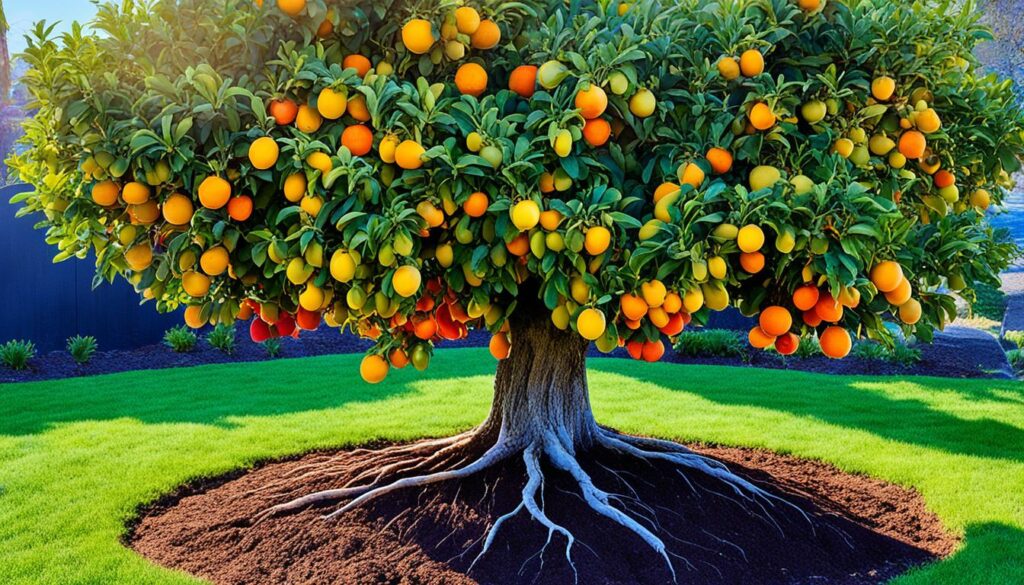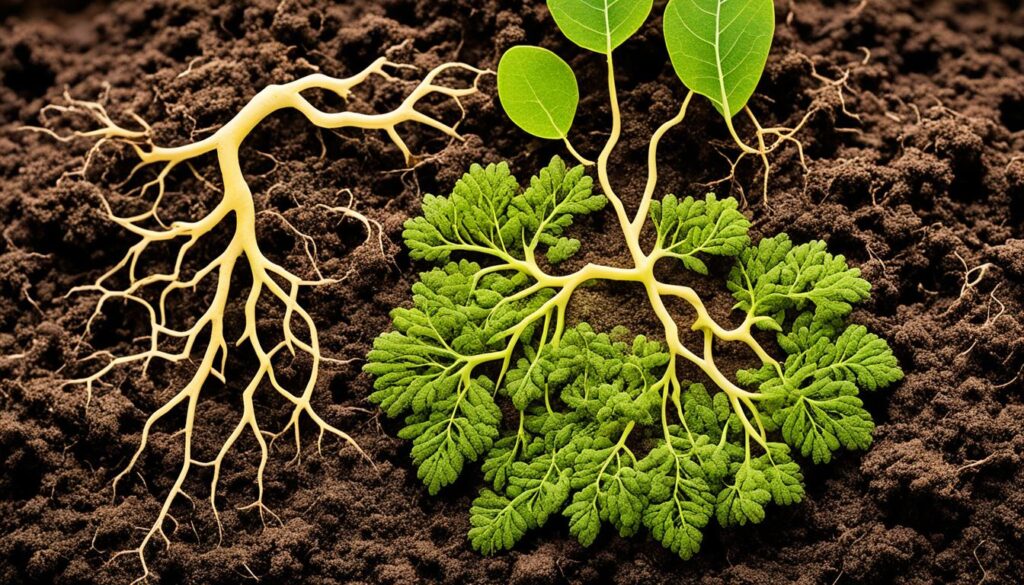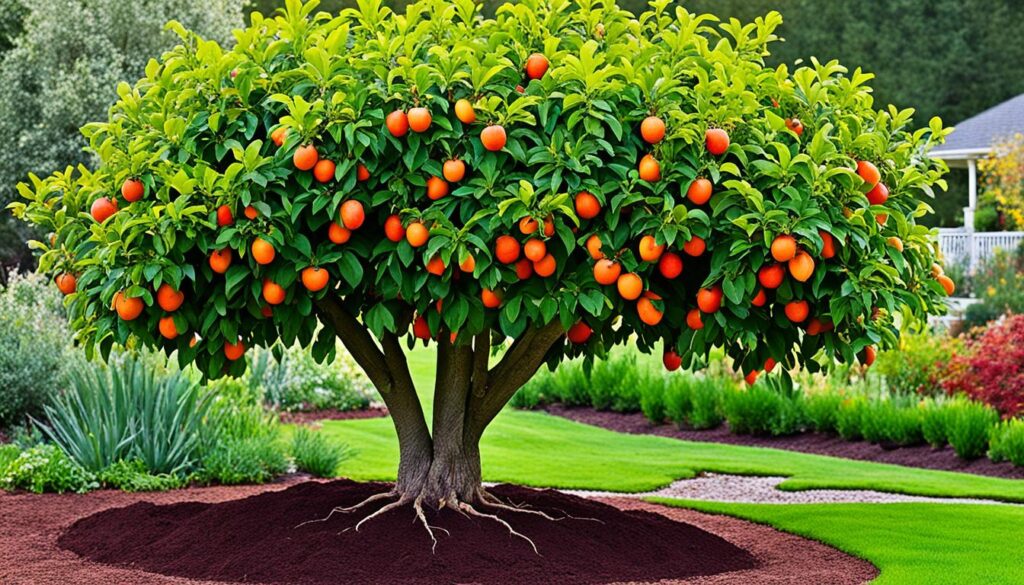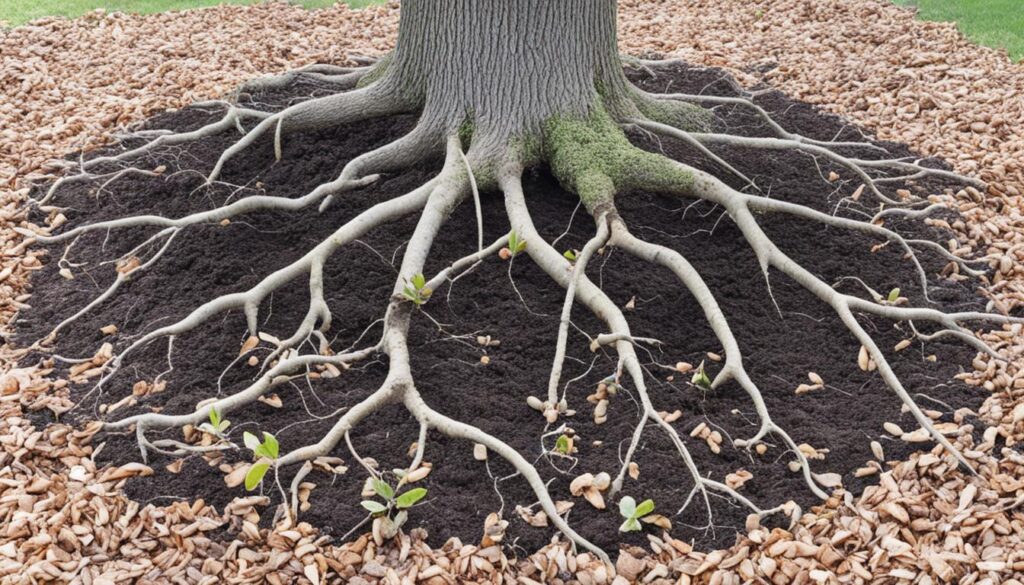Have you ever thought about why some fruit trees do well while others don’t? It might be because of the soil quality. Healthy soils with the right mix of physical, chemical, and biological properties are key for fruit trees to grow well But what makes soil «healthy,» and how can you make sure your trees get what they need?
This article will look at how soil quality helps fruit trees grow and produce well. We’ll cover everything from the best soil temperatures for roots to the role of soil organic matter and nutrient cycling. You’ll learn the main factors that make an orchard thrive. By managing your soil well, you can help your fruit trees reach their best and have lots of fruit for years.
Understanding Optimal Soil Temperatures for Fruit Tree Roots
Keeping the soil at the right temperature is key for fruit trees. The best soil temperature for apple roots is between 64 to 77°F (18 to 25°C). If it gets too hot, above 86°F (30°C), it can harm the roots. This leads to root damage, browning, and makes them more likely to get sick. To keep fruit tree roots safe from heat, using mulch is a good idea.
Soil temperature greatly affects how plants grow and develop. Changes in soil temperature happen every month, season, and day. These changes affect when to plant and how well plants do.
Warm soil helps plants grow by letting them take in more water and nutrients. Cold soil makes plants take in less water and slows down photosynthesis. This can make plants grow slower.
Optimal Soil Temperatures for Fruit Trees
Studies show that the best soil temperature for apple roots is 64 to 77°F (18 to 25°C). If it gets hotter than 86°F (30°C), it can hurt the roots. This causes them to mature, turn brown, and get sick easier. Using mulch can help keep soil temperature right and protect the roots from heat.

Soil temperature is very important for the soil’s health. It affects how plants take in water and nutrients, their growth, and when to do certain tasks. Knowing the best soil temperature for different fruit trees is key to keeping them healthy and productive.
The Role of Soil Organic Matter in Nutrient Availability
Soil organic matter is key for fruit trees to get the nutrients they need. It acts like a natural storage for nutrients. These nutrients are held by soil organic matter’s negative particles. This is called cation exchange capacity (CEC).
CEC helps keep more nutrients in the soil for plants to use. This is important for fruit trees to grow well.
Soil with a high CEC can hold more nutrients like potassium and magnesium. These are vital for fruit trees. Keeping enough soil organic matter is crucial for fruit trees that grow every year.
Organic Matter Enhances Nutrient Retention
Organic matter also keeps nutrients like phosphorus and potassium from being lost. It helps make these nutrients available to fruit trees. This is done by creating special complexes with micronutrients.
Soils with low CEC can get a big boost from organic matter. It helps them store and release nutrients better. This is key for keeping fruit trees healthy and productive.
| Soil Organic Matter Level | Nutrient Availability | Cation Exchange Capacity (CEC) |
|---|---|---|
| Low ( | Imbalanced, deficient | Lower |
| Moderate (2-4%) | Adequate, balanced | Higher |
| High (>5%) | Excessive, may require more herbicides | Highest |
Knowing how soil organic matter affects nutrient availability and CEC helps fruit growers. They can make better choices for their orchards.

Soil Biota and Nutrient Cycling
Soil is full of different organisms like bacteria, fungi, nematodes, and microarthropods. They are key in making nutrients available for fruit trees. These creatures help turn hard-to-get nutrients into forms that trees can use, like ammonia (NH₄⁻N) and phosphorus.
In farms, there can be a lot of these organisms. For example, there might be up to 5,000 pounds of bacteria and fungi, 800 pounds of arthropods, 300 pounds of protozoa, and 100 pounds of nematodes per acre. A teaspoon of productive soil can have between 100 million and one billion bacteria. In some places, protozoa count can be from 72 to 270 thousand per gram of soil.
Nematodes can help release 28 lbs/acre/year of nitrogen. They can also cycle nutrients from 97 to 617 mg N/kg of soil each year. Microarthropods, like mites and collembolans, are also in orchard soil. They can be found from zero to 25,000 per meter square in the top four inches.
Keeping soil biodiversity healthy is key for fruit trees. It helps them grow well and produce more. By knowing how soil organisms in nutrient cycling work, growers can make their soil better for fruit trees.

Importance of Soil Quality for Fruit Trees
The quality of the soil is key for fruit trees to thrive. Studies show that healthy soils help trees grow bigger and produce more. Adding organic matter to the soil can make it better for fruit trees.
Good soil is vital for fruit trees to do well. Soil tests tell us about nutrients, pH, and other important things. Knowing what your trees need helps you make better soil plans. This way, you can have lots of good fruit for a long time.
The Benefits of Improving Soil Quality for Orchards
- Increased nutrient availability and uptake by fruit trees, leading to larger and more consistent yields
- Enhanced soil water-holding capacity, reducing the need for frequent irrigation and improving drought resilience
- Improved soil structure and aeration, promoting healthier root development and growth
- Increased microbial activity and diversity, contributing to better nutrient cycling and disease suppression
- Reduced susceptibility to soil compaction, which can restrict root growth and impair nutrient and water absorption
By focusing on soil quality, fruit growers can make their orchards better. This leads to more fruit and a sustainable future.

Soil Compaction and Root Growth
Healthy fruit tree roots are key for trees to do well and produce a lot. But, soil compaction can really slow down root growth. This means trees might not get enough water and nutrients. This can hurt the health and productivity of your fruit trees.
Assessing Soil Compaction Levels
To find out if your soil is compacted, you can use a penetrometer. This tool checks how hard it is to push into the soil. Knowing the compaction level helps you fix the problem with the right soil care.
Alleviating Soil Compaction
If your soil is too compacted, there are ways to fix it. These methods help your fruit tree roots grow strong:
- Subsoiling: This deep tillage breaks up hard soil, letting water and air in better.
- Cover cropping: Growing cover crops adds organic matter and makes the soil better over time.
- Reducing heavy equipment traffic: Using less heavy machinery keeps the soil from getting more compacted.
| Soil Compaction Impact | Research Findings |
|---|---|
| Yield Reductions | Soil compaction can cut crop yields by up to 60%. It hurts emergence, growth, and nutrient uptake. |
| Root Growth Restriction | Compacted soils hurt seed germination, seedling emergence, root growth, and nutrient uptake. |
| Greenhouse Gas Emissions | Soil compaction increases greenhouse gases and ammonia losses. |
Fixing soil compaction and using the right soil care helps your fruit tree roots grow well. This makes your orchard more productive and successful.

Water Availability and Soil Structure
The structure and organic matter content of the soil are key for fruit trees to get enough water. Soils that are light, full of holes, and drain well are best for fruit trees. They help trees grow big, produce more, and have better fruit quality.
Practices that make soil better can help it hold more water and drain well. Proper soil structure and high organic matter content are vital. They help with water availability and soil water holding capacity. These are important for fruit tree performance.
| Soil Characteristic | Impact on Fruit Tree Performance |
|---|---|
| Soil Drainage | Poor drainage can lead to root stress and soil-borne disease susceptibility, negatively affecting fruit tree growth and yield. |
| Soil Compaction | Compacted soils restrict root growth and water/nutrient uptake, hindering fruit tree development. |
| Soil Organic Matter | Higher organic matter levels improve the water-holding capacity of the soil, ensuring adequate moisture for fruit trees. |
By using the best soil management, growers can make their fruit trees do better. They create a great place for their trees to grow.
Soil pH and Nutrient Availability
Keeping the soil pH right is key for fruit trees to thrive. Most fruit trees do best in a pH of 5.8 to 6.5. This is a bit acidic and helps plants get the nutrients they need.
Soil pH affects how well plants can get nutrients like calcium, magnesium, phosphorus, and sulfur. If the soil is too acidic, these nutrients can’t get to the roots. This slows down the tree’s growth.
To fix this, growers might add lime or gypsum to the soil. This changes the pH and makes nutrients available again. This helps fruit trees grow better.
| Nutrient | Optimal Soil pH Range | Impact of Soil pH |
|---|---|---|
| Calcium (Ca) | 6.0 – 7.0 | Calcium availability decreases in acidic soils, leading to potential deficiencies. |
| Magnesium (Mg) | 6.0 – 7.0 | Magnesium becomes less soluble in acidic soils, reducing its uptake by plants. |
| Phosphorus (P) | 6.0 – 7.0 | Phosphorus availability is reduced in both acidic and alkaline soils, with the optimal range being slightly acidic. |
| Sulfur (S) | 6.0 – 7.0 | Sulfur availability is highest in slightly acidic soils, with deficiencies more common in alkaline conditions. |
Keeping the soil pH right helps fruit trees get the nutrients they need. Regular tests and adding lime or gypsum can make nutrients available. This leads to healthier and more productive trees.
Soil Amendments for Fruit Tree Success
Using soil amendments can make orchard soils better. Adding organic matter like compost or manure helps the soil. It makes the soil better at holding water, giving out nutrients, and staying healthy. This is key for growing fruit trees well.
Experts say mix 50% native soil with 50% compost for fruit trees. Add about 1/2 to 1 yard of compost per tree when preparing the soil. Choose high-quality compost without additives or chemicals to help trees grow strong.
Planting fruit trees in the fall season is best for their growth. Test the compost for sodium levels and contaminants before using it. This makes sure the soil is good for the trees.
To get the soil ready, sift and mix native soil with compost in a wheel barrel. Making a water well around the tree helps with watering and growth.
These soil amendment practices help build soil health. This is important for growing fruit that is full of nutrients. Watch the trees for water stress and use drip or soaker watering systems to help them.
For fruit trees to do well, the soil must be easy for roots and water to get through. With careful planning to improve the soil, your fruit tree orchard can thrive. This leads to lots of tasty, healthy fruit.
Orchard Floor Management Strategies
Keeping the orchard floor in good shape is key for soil health, tree growth, and more fruit. Growers use strategies like mulching, cover crops, and living mulches. These help with site-specific needs and goals.
The Impact of Mulches and Cover Crops
Mulches and cover crops boost soil quality, help with nutrients, and fight weeds in fruit tree orchards. Organic mulches keep soil temperatures right, hold moisture, and improve its structure. Cover crops fix nitrogen, increase soil organic matter, and support good bugs.
Site-Specific Considerations
Choosing the right orchard floor management depends on the site and goals. Climate, soil type, tree age, and pests matter when picking the best method. For example, in dry areas, managing cover crops’ water use is key to helping fruit trees.
With a good orchard floor management program, growers can make soil better, boost tree health, and make their fruit tree work more productive and green.
Monitoring Soil Health Indicators
Checking your orchard’s soil health often is key for your trees to grow well. Important soil health indicators include soil compaction, how well it holds water, and its organic matter content. Also, look at soil biota, pH, and nutrient levels. By doing periodic soil tests, you can make smart choices about how to care for your soil. This helps your fruit trees grow better and last longer.
Soil compaction can hurt root growth and make it hard for trees to get water and nutrients. It’s important to use a penetrometer to find out if your soil is compacted. Soil with more organic matter is better at holding nutrients for your trees. Checking the cation exchange capacity (CEC) tells you how well your soil stores and gives out important nutrients.
The biological activity in your soil is key for breaking down nutrients and making them available to trees. By looking at the number and types of tiny creatures in your soil, you can see how healthy your orchard is.
Keeping the optimal soil pH between 5.8 and 6.5 is vital for fruit trees. This range helps trees get the nutrients they need like calcium and phosphorus. Soil tests can show if you need to add lime or gypsum to fix the pH and help nutrients get to your trees.
By always monitoring soil health indicators and acting on what you learn, you can keep your fruit orchard healthy and productive for a long time. This way, your trees will stay healthy and give you lots of delicious fruits.
Integrated Soil Quality Management for Sustainable Fruit Production
For long-term, sustainable fruit production, we need a complete plan for soil management. This plan looks at the soil’s physical, chemical, and biological sides. It helps growers make the best conditions for their fruit trees. This includes adding organic matter, using specific amendments, planting cover crops, and watching soil health.
Using a full plan for soil management is key for better orchard productivity and strength. This way, growers can handle big changes in production and meet the world’s growing food needs. By using many soil care methods, they can keep fruit yields steady, stay financially strong, and help feed the world.
With climate change getting worse, managing soil, fruit, and climate together is vital for growing apples sustainably. This method uses new orchard practices, like pruning and saving water, to keep soils healthy and rich in nutrients. By doing this, growers can make their apple production more stable. This helps their business and the planet.



